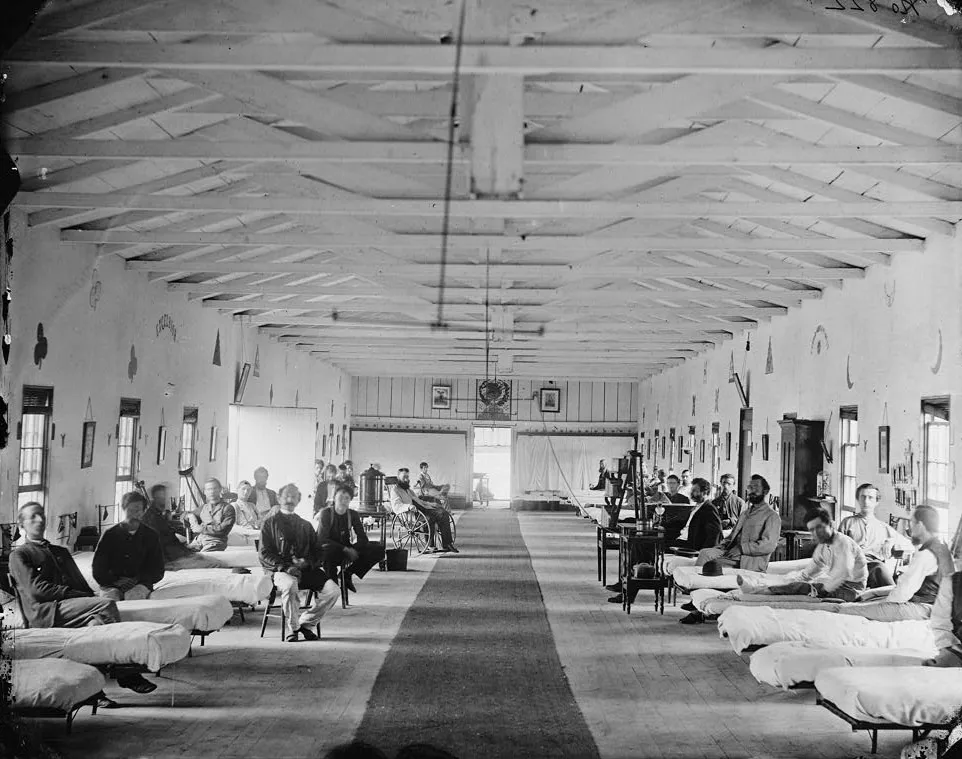
Georgeanna Woolsey was a young unmarried woman when the Civil War began. Shortly after the start of the war, the Woman’s Central Relief Association (a part of the U.S. Sanitary Commission) organized a volunteer nursing staff for the United States Army. In May 1861 she was one of one hundred women selected to become a volunteer nurse. With no prior medical training, she was sent to New York for, what she called in her diary, “a month’s seasoning in painful sights and sounds.”
We took off our bonnets and went to work. Such a month as we had of it, walking round from room to room, learning what we could—really learning something in the end, till finally, what with writing down everything we saw, and making elaborate sketches of all kinds of bandages and the ways of applying them, and what with bandaging everybody we met for practice, we at last made our ‘reverses’ without a wrinkle; and at the end of the month were competent to any very small emergency, or very simple fracture.

She was assigned to Washington, D.C. in July 1861, where, she wrote:
Miss [Dorothea] Dix received us kindly and gave us a good deal of information about the hospitals, and this morning we went to the Georgetown Hospital to see for ourselves. We were delighted with all the arrangements. Everything was clean and comfortable. We shall go again and take papers and magazines.
Her pleasant early experiences were misleading, however. Later, looking back on her nursing career, she remarked:
No one knows who did not watch the thing from the beginning, how much opposition, how much ill-will, how much unfeeling want of thought, these women nurses endured. Hardly a surgeon whom I can think of received or treated them with even common courtesy. Government had decided that women should be employed, and the Army surgeons—unable, therefore to close the hospitals against them—determined to make their lives so unbearable that they should be forced in self-defense to leave.
She did not leave. As fighting became more intense, a makeshift hospital was set up in the Washington, D.C. patent office (now the National Portrait Gallery), where she continued to work as a nurse. She described her experiences:
On the stacks of marble slabs…we spread mattresses, and put the sickest men. As the number increased, camp beds were set up between the glass cases in the outer room and we alternated—typhoid fever, cogwheels and patent churns, typhoid fever, balloons and mouse traps…Here for weeks, went on a sort of hospital pic-nic. We scrambled through with what we had to do…Here for weeks we worked among these men, cooking for them, feeding them, washing them, sliding them along on their tables, while we climbed up on something and made up their beds with brooms, putting the same powders down their throats with the same spoon, all up and down what seemed half a mile of uneven floor; coaxing back to life some of the most unpromising—watching the youngest and best die.
Georgeanna Woolsey lived with her married sister Eliza Woolsey Howland in Washington, D.C. while Eliza's husband, Joseph Howland, was serving in the Union Army of the Potomac. When the Army of the Potomac was ordered to leave the capital, Georgeanna and Eliza wanted to travel with it. They tried several times to get permission but were unsuccessful until the Sanitary Commission gave them positions on the hospital ship Daniel Webster. They sailed after the army in April 1862. She wrote:
Sunday, the first day [on the ship] was gone. As for us, we had spent it sitting on deck, sewing upon a hospital flag fifteen by eight, and singing hymns to take the edge off this secular occupation. It is to be run up at once in case we encounter the Merrimac.
Georgeanna's letters after 1862 were lost to a fire, but it is easy to see how the war had affected her over the course of one year. In May 1862, she wrote:
We are changed by all this contact with terror, else how could I deliberately turn my lantern on his [a wounded soldier’s] face and say to the Doctor behind me, “Is that man dead?” and stand cooly, while he listened and examined and pronounced him dead. I could not have quietly said, a year ago, “That will make one more bed, Doctor.”
— Source: "Letters of a Family During the War 1861-65," Privately published in 1899 by Georgeanna Woolsey Bacon and Eliza Woolsey Howland.





